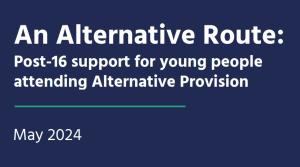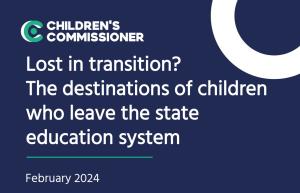As Children’s Commissioner it is my job to make sure that children’s rights are respected and that their views and interests are heard across government. Article 28 of the UN Convention on the Rights of the Child (UNCRC) sets out that every child has the right to an education. Since becoming Children’s Commissioner in March 2021, I have heard loud and clear from children across the country how important access to education is to them. School is where children prepare for their future, discover their passions both academic and extra-curricular, form friendships and develop the skills they will carry with them for the rest of their lives.
As one girl who responded to my survey, The Big Ask, which heard from 550,000 children making it the largest survey of its kind ever, said:
‘People don’t realise how much education is important for life in general. […] if they don’t learn in school, they might not be able to enjoy life to the fullest’ – Girl, 14, The Big Ask.
The coronavirus pandemic had an undeniable impact on the education of children across the country, almost two years on from the first lockdown we are still trying to understand just how deep that impact runs. However, even before the pandemic, there has been a group of children who have struggled to attend school regularly and who have fallen through the gaps in the education system. While the pandemic has influenced children’s attendance through increased absence due to illness, in the autumn and spring of 2021/22, I estimate that 818,000 children were persistently absent, meaning that they missed at least 10% of possible school sessions, for reasons other than just illness. In the same period, Department for Education statistics show that the number of children who missed 50% or more possible education sessions was almost double pre-pandemic levels at 110,000 compared to 57,000 in 2018/19ii. The Children’s Commissioner is particularly concerned with children not receiving any education who are difficult to identify.
I have spent the past year relentlessly focused on these children, launching my ‘Attendance Audit’ in January 2022 to speak to children missing from and struggling to engage with education and find out what they need to get back into school. The audit has investigated all levels of the education system and has prioritised children’s voices and experiences throughout. I have seen clearly that children aren’t absent from school because they don’t want to learn. On the contrary, they are desperate to learn but everyday thousands of children find themselves without the support that they need to engage in education and attend school. As one girl explained to my team recently:
‘I physically could not get out of bed to get myself into school and it sucked because I love learning’ – Girl, 15, attending an online alternative provision.
Children are ambitious for their futures so the systems in place to support them must be equally ambitious. My target for 100% attendance in schools is not about punishing or targeting parents if they, at present, do not have the support they need for their child to attend school. This is a challenge for the education and social care system. If government accepts even 1% of children being persistently absent, that is almost 100,000 children who are in need of support, but the system leaves them behind.
So, those responsible for this system, right across not just education and social care but health, housing, and benefits, from headteachers all the way to Secretaries of State, need to stand up and say that attendance is their business, and they will do what it takes to get children the support and care they need to access education. The road to seeing all children engaged in education also involves better information sharing, supported by the introduction of a consistent child identifier and sharing best practice.
I am extremely pleased that the Education Select Committee has launched this inquiry into children’s absence from school. It will take a concerted, cross-government effort to address the barriers that children currently face to accessing education and it is right that the inquiry focuses on identifying what works to support children’s attendance.
To support the inquiry, I have summarised here the key findings from my attendance audit reports: ‘Where are England’s Children? Interim findings from the Children’s Commissioner’s Attendance Audit’, ‘Voices of England’s Missing Children’, ‘Back into school: New insights into school absence’ and ‘Education history and attendance’, alongside evidence from other investigations.
I am incredibly grateful to the children and young people who shared their experiences with me and informed the findings of the audit. Often, discussing barriers to education involved children sharing personal and very difficult circumstances with me and my team and I am always inspired by their courage and honesty. It is now up to us to listen to what they have said and take real action to give them the education that they deserve.





